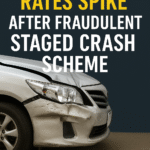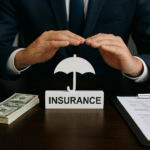
Introduction
Insurance is a vital part of financial security for individuals and businesses alike. Whether it’s auto, home, health, or life insurance, having the right coverage can make all the difference when unforeseen events occur. However, Florida’s vibrant insurance market also attracts its share of fraudsters and scammers looking to exploit unsuspecting policyholders. Understanding how these scams operate and knowing how to protect yourself is crucial. In this blog, we’ll cover the most common insurance scams in Florida and provide actionable tips to safeguard your personal information and finances.
Why is Florida a Hotspot for Insurance Scams?
Florida’s large population, frequent natural disasters, and complex insurance landscape make it a prime target for fraudsters. The state has a higher-than-average rate of staged accidents and fraudulent claims, making it essential for residents to stay vigilant. Insurance fraud not only affects individual policyholders but also drives up premiums for everyone. By recognizing the warning signs of a scam and understanding how to avoid them, Floridians can protect themselves and help reduce fraud rates across the state.
Common Types of Insurance Scams in Florida
Insurance scams can take many forms, ranging from staged accidents to fake insurance policies. Here are some of the most prevalent types in Florida:
1. Staged Auto Accidents
- How It Works: Fraudsters deliberately cause car accidents and then file exaggerated or false claims for injuries and vehicle damage. Common tactics include sudden stops to cause rear-end collisions or intentionally sideswiping vehicles.
- Warning Signs: Drivers who suddenly stop without reason, erratic driving behavior, or unfamiliar vehicles following too closely may indicate a staged accident.
2. Fake Insurance Agents and Policies
- How It Works: Scammers pose as legitimate insurance agents, offering fake policies at unusually low rates. Once the victim pays, they receive counterfeit documents or nothing at all, leaving them uninsured.
- Warning Signs: Offers that seem too good to be true, high-pressure sales tactics, and agents who refuse to provide licensing information are red flags.
3. Inflated or False Property Damage Claims
- How It Works: After a natural disaster, such as a hurricane, some contractors may encourage homeowners to inflate their damage claims or even submit false claims. In exchange, the contractor may offer kickbacks or inflated repair bills.
- Warning Signs: Contractors who offer to handle insurance claims on your behalf, demand upfront payment for services, or suggest adding damage to your claim that wasn’t caused by the event.
4. Medical Billing Fraud
- How It Works: Some healthcare providers submit bills for services that were never rendered or inflate the cost of services provided. This scam often involves staged accidents where participants claim non-existent injuries.
- Warning Signs: Receiving bills for services you don’t remember receiving, excessive diagnostic tests, or pressure to undergo unnecessary procedures.
5. Identity Theft and Insurance Fraud
- How It Works: Scammers steal personal information and use it to take out policies in your name or make false claims against your existing policies. This can lead to denied claims, higher premiums, or worse.
- Warning Signs: Unexplained charges on your bank statements, receiving insurance documents for policies you didn’t purchase, or notices about claims you didn’t file.
How to Protect Yourself from Insurance Scams in Florida
Preventing insurance fraud starts with awareness and taking proactive steps to protect your personal information and finances. Here are some strategies to help you avoid falling victim to these scams:
1. Verify the Legitimacy of Insurance Agents and Policies
- Always confirm that the insurance agent and their company are licensed in Florida. You can check the Florida Department of Financial Services website or call their consumer helpline.
- Review policy documents carefully before signing and never feel pressured to make immediate decisions.
2. Be Cautious After Natural Disasters
- Be wary of contractors who show up unsolicited after a natural disaster. Always verify their credentials and check for complaints with the Better Business Bureau or the Florida Department of Business & Professional Regulation.
- Never sign blank insurance claim forms or contracts that assign benefits to third parties.
3. Protect Your Personal Information
- Keep your personal information, including your Social Security number and insurance policy details, private and secure.
- Shred documents containing personal information before disposing of them and be cautious when sharing information over the phone or online.
4. Stay Vigilant with Medical Bills and Services
- Regularly review your Explanation of Benefits (EOB) statements from your health insurance provider to ensure that all listed services were actually provided.
- Be skeptical of providers who recommend unnecessary procedures or ask for payment upfront for services that should be covered by your insurance.
5. Report Suspected Fraud Immediately
- If you suspect insurance fraud, report it immediately to the Florida Department of Financial Services’ Division of Investigative and Forensic Services.
- Contact your insurance company directly to alert them of any suspicious activity or billing discrepancies.
What to Do if You’ve Been a Victim of an Insurance Scam
If you suspect that you have fallen victim to an insurance scam, take the following steps immediately:
- Contact Your Insurance Provider: Notify your insurance company about the suspected fraud and provide them with any relevant documentation.
- File a Report with the Authorities: Report the fraud to the Florida Department of Financial Services and, if necessary, your local police department.
- Monitor Your Credit: Keep an eye on your credit report for any unusual activity or new accounts that you did not authorize.
- Seek Legal Assistance: Consult with a legal professional to understand your rights and explore potential recovery options.
Conclusion
Insurance scams are a significant problem in Florida, affecting countless residents every year. By staying informed and taking preventative measures, you can protect yourself and your family from these costly schemes. At Island Insurance Group, we prioritize your safety and well-being. Our team of experienced professionals is here to help you navigate the complex world of insurance and provide you with trustworthy advice.
If you have any questions or concerns about your insurance coverage or suspect you may be a victim of a scam, don’t hesitate to contact Samuel Bennett at Island Insurance Group today. We’re here to provide peace of mind and ensure you have the protection you need.
Contact Samuel Bennett
Island Insurance Group
Phone: 954-804-8144
Email: sam@islandinsurancegreoup.com





